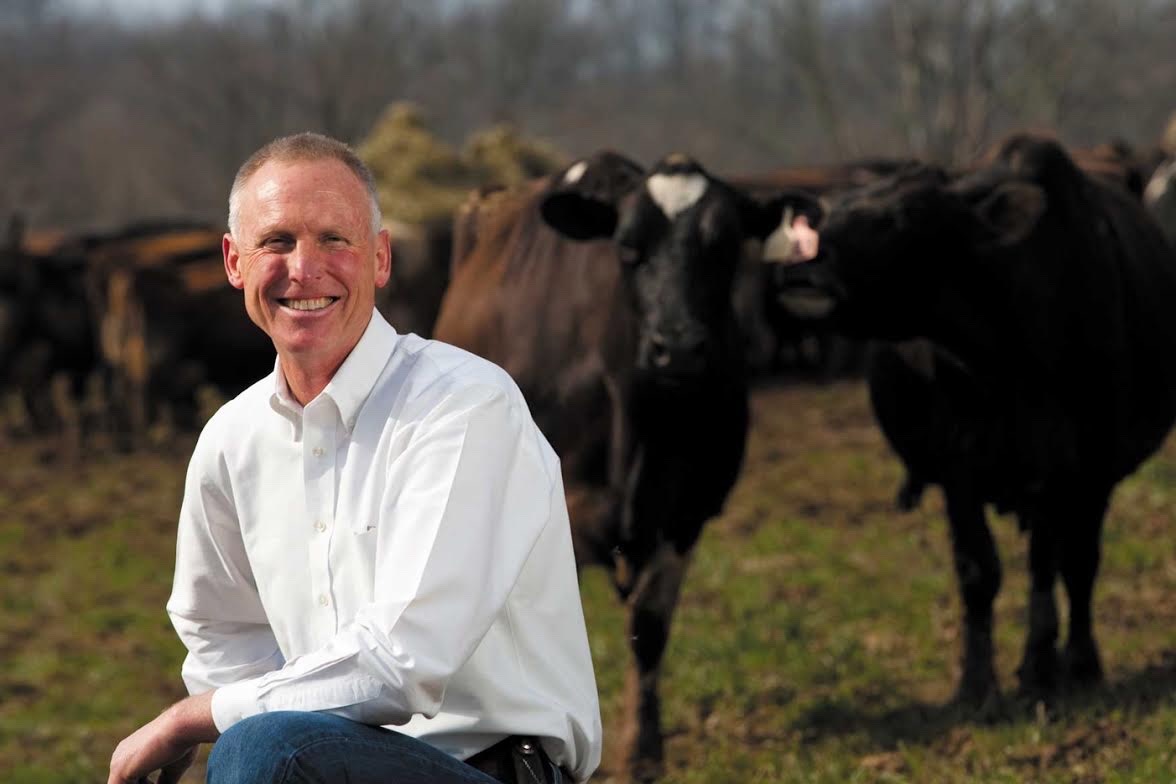Gluten-free, organic, Fair Trade, you name it—there are all kinds of labels for shoppers to decipher on supermarket shelves these days. And advocates concerned about genetically modified (GMO) foods are making the argument that it’s now time to clearly label GMO products for consumers as well.
Such labels might be pretty straightforward for products like corn and soy, which are often directly genetically modified. But meats and dairy present possible gray areas. For instance, what if your milk came from cows that have been fed genetically modified grain? Should that milk be allowed to carry a non-GMO label?
Warren Taylor, who owns a small creamery in southern Ohio and sells his own line of milk and yogurt at Whole Foods, thinks the answer to that question is clearly ‘no.’ He goes to great lengths to make sure his milk comes from cows that only eat non-GMO grain. And he’s worried that his niche of selling regional, GMO-free milk products could be threatened if big dairies are allowed to label their products as GMO free—even if their milk comes from cows that eat genetically modified grain. In fact, a bill that passed the U.S. House last summer would allow dairies to do just that.
LISTEN: “Inside the Debate Over GMO Labeling”
It’s something that’s becoming an issue nationwide. For example, a woman in California is suing Chipotle over its claim that its menu is GMO-free. The lawsuit alleges Chipotle serves meat, cheese and sour cream that come from animals that eat GMOs.
Warren Taylor wants a federal law that would first and foremost make GMO labeling mandatory. He’s been spending a lot of time in Washington recently—fighting a U.S. Senate bill that would have created a voluntary national labeling system and made it illegal for states to require GMO labels on food products.
“I think voluntary labeling, it’s a dodge,” Taylor says. “It’s dishonest. It means no labeling at all.”
The Senate just voted down that bill, which some consumer advocates are calling a win. Democrats have introduced alternatives. But Taylor says that any comprehensive GMO labeling law must also address gray areas for products like milk or meat, which may not be genetically engineered themselves, but come from animals which may be feeding on GMOs.
For Dave Carlin, it’s a pretty clear-cut distinction. He’s vice president at the International Dairy Foods Association, which represents big dairy corporations like Borden and Dannon.
“Just because you feed a cow GM feed does not make the milk that comes from that cow GM,” Carlin says. “Just as if we fed a cow chocolate, it doesn’t make the milk that comes out of that cow chocolate milk. It just doesn’t work that way.”
The Food and Drug Administration supports that position. In an email to the Allegheny Front, the FDA says when cows eat GMO feed, it doesn’t make the milk itself genetically engineered.
But advocates argue this is only one consideration with GMO labeling. There’s also an issue of transparency. Some companies like Campbell’s Soup have already started identifying genetically engineered ingredients on their labels. Carlin says that’s fine if they want to, but it shouldn’t be required.
“Because there is no health or safety reason why GMO labeling should be required, there’s not a good argument for why we should mandate companies to disclose that information,” Carlin says. “That’s something we have heretofore not done.”
“Just because you feed a cow GM feed does not make the milk that comes from that cow GM. Just as if we fed a cow chocolate, it doesn’t make the milk that comes out of that cow chocolate milk.”
But Chris Miller, the social activism manager with ice cream maker Ben and Jerry’s, argues there are many examples of labeling requirements that are not strict measures of safety.
“The disclosure of artificial colors, artificial sweeteners, farm-raised salmon, concentrated orange juice—all of these things are not a safety issue,” Miller says. “We don’t allow food companies to sell something that’s unsafe by putting a label on it. This is not a warning label; this is not about safety. This is about transparency and consumers understanding what they buy. It’s that simple.”
Surveys show a majority of Americans support GMO labeling. The food industry has continued to argue that mandating labels would amount to adding an unnecessarily alarmist “Scarlet Letter” to their products.
Back in Ohio, farmer Warren Taylor says he will continue to fight for a labeling system that requires full transparency.
“We have a right to know the process,” he says. “We have a right to support the processes by which our food is produced and make our own judgement as to whether we support those processes.”

